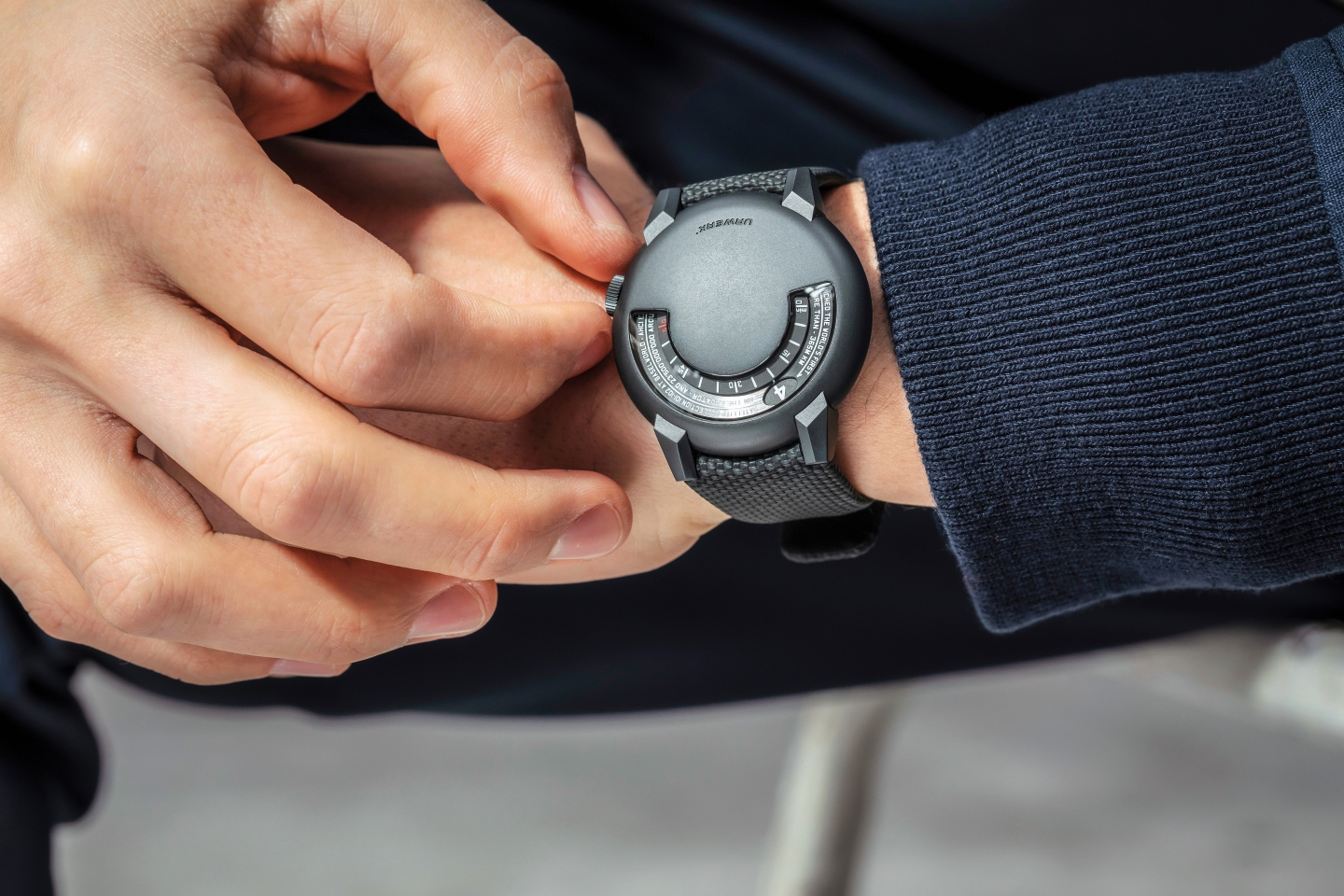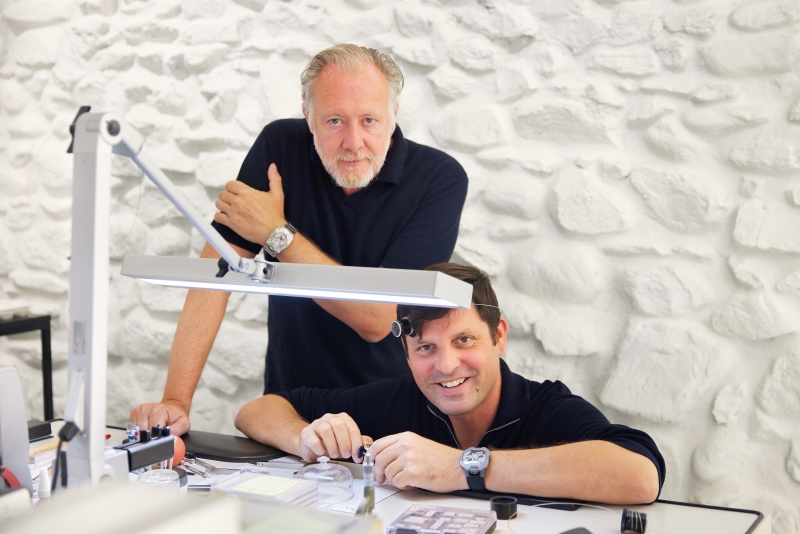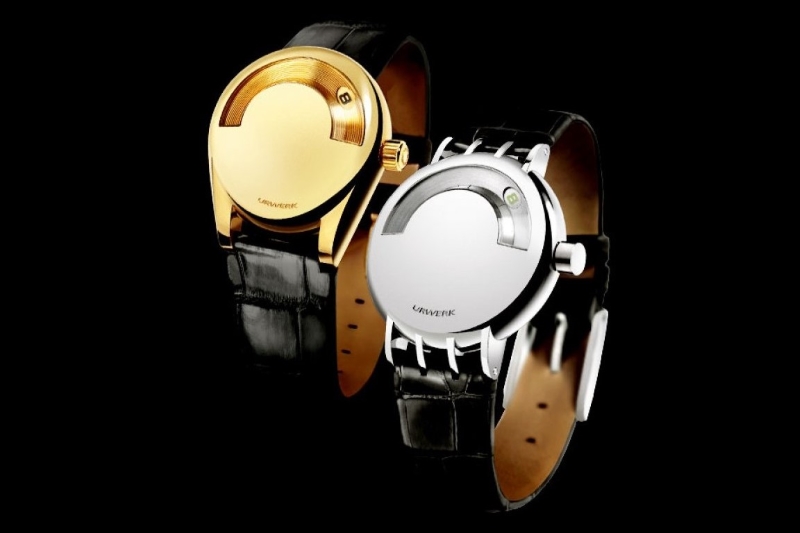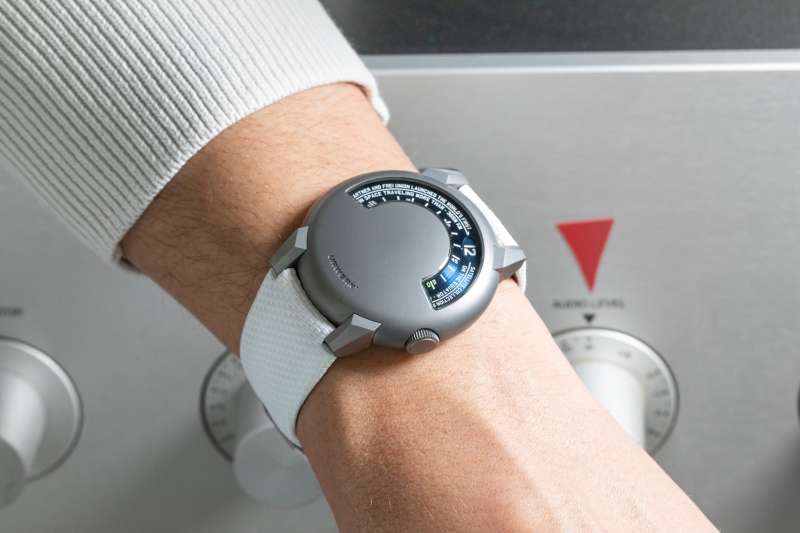
The UR-102 Reloaded in black (All photos: Urwerk)
The constant refrain of the dreaded quarter-life crisis is often fettered with bouts of uncertainty and questions about one’s “true calling”. But this is scarcely the case for Felix Baumgartner and Martin Frei, co-founders of independent Swiss brand Urwerk. Surfing at the crest of the wave, Urwerk does not really require a seat at the table occupied by the big leagues. Instead, it has carved out a unique space for itself through the founders’ ingenuity and cognisance in the realm of technology.
It has been 26 years since the brand’s inception. To think it all started with a pair of funky space-like timepieces, fashioned by a couple of young, zealous enthusiasts overdriven with avidity who somehow ended up at the Académie Horlogère des Créateurs Indépendants.
Picture a handful of university students partying up at a New Year’s Eve do in southern Switzerland. Dinner, wine and Sixties punk on vinyl set the scene for the forging of youthful friendships. That cold winter night was enkindled by inspiring discussions about dreams and passions. Frei met Baumgartner’s older brother, Thomas, then. And when the younger sibling began tagging along to subsequent hangouts, the wild and ambitious exchanges about art, watchmaking, music and science fiction burgeoned even further. They were set on this crazy idea to make a watch together. It had to have a cool concept, of course.
_ra_5485.jpg

The Baumgartner brothers soon presented an idea: A watch with no hands, where the hours also indicate the minutes. Frei began sketching. Two years later in 1997, Frei and lil Baumgartner inaugurated Urwerk — a portmanteau of the ancient Mesopotamian city of Ur, where the foundations of timekeeping were laid, and the German word “werk”, which means “to work”, “to construct”, “to evolve”, “to shape”, “to forge” or “to provoke emotions” — by debuting the UR-101 and UR-102 at Baselworld. The futuristic creations featured a roaming hour hand and semi-circular minute track at the top. They were wildly different from what was de rigueur at the time, but represented the duo’s first collaboration and marked the introduction of Urwerk’s story.
The brand would go on to develop more complicated, elaborate and theatrical pieces. Frei says a significant chapter for Urwerk was when Baumgartner took on the Opus V project under the supervision of Maximilian Büsser, who was managing Harry Winston’s Rare Timepieces division then. The legendary watch was Büsser’s last Opus project with Harry Winston before he left to establish MB&F and when Urwerk began to garner proper attention.
The idea of a revisitation came about in conversation with Michael Tay, managing director of The Hour Glass. “That was still in Basel, you know, a couple of years ago,” Frei shares. “We were talking at our booth and he suggested, ‘Why don’t you do a retro redesign of your first watch?’. Because nobody has really seen it. Our early watches in the first six, seven years, were not known at all. We were just a small brand.”
ur-101-102.jpg

“These two watches were a bit under the radar,” Frei continues. After that conversation with Tay, the duo had it in their minds to bring them back. A revisitation could not be more apposite to mark a quarter century in business. Hence, the UR-102 Reloaded was released and again, they came in pairs — this time, in Titanium and Black.
They follow many design cues of its 1997 counterpart, such as the pebble-like form and arched window, but now measures a respectable 41mm instead of 38mm with restyled, more angular lugs, which were originally inspired by the attachments on the Sputnik satellite. The new lugs position the watch ergonomically and comfortably on the wrist without it looking imposing.
“I had the chance to redo certain things to make it better,” shares Frei. “We had a big crown and I liked that. It was a conscious decision because I wanted one where you could actually feel the moment when you give energy to the movement.” The arched windows were widened with sloping edges so you see the next hour peeping out at the other corner. To accommodate the window’s growth, the crown was given a new position at 4 o’clock. It was also sunk into the case for a cleaner, minimalist look. The font of the hours and minutes markers has been redesigned too, with new information appearing on the dial: texts relating to the history of the UR-102 as well as the distance travelled by the Earth around the Sun since the launch of the model — 23,500,000,000km in 26 years. “Another interesting way to measure time,” he adds.
urwerk_102_reloaded_new_04.jpg

Looking back at how far they have come, Frei says Urwerk’s driving force remains the same. “It’s still curiosity. I’d say as a child, your job is to take in the world, to learn about it. That’s normally accepted for a certain amount of time and then you think you’re finished, you’re done. But in actual fact, you never needed to stop. So if you have a job — and that’s what we have here, inventors on every level with technology — we don’t have to stop being curious. That’s how I think. Especially at Urwerk, when we decided to be an avant garde brand, it’s actually programmed. We have to invent new things and that’s what we like to do.”
Frei is not too concerned about rapid evolution. When asked about the brand’s future, he says, “I envision it growing slowly. Because I think in our economy and world, we have always gone up and down. And if you’re reacting too fast, you might still be too late because you may be in the wrong moment with the wrong measurement. One way to face this, in fact, is actually to grow very slowly, very controlled.”
Twenty years ago, Urwerk was one of the very few independent brands around who did the hard work of educating people about the wider world of watchmaking, showing the potential visage beyond commercial offerings. “Now, we’re not the only ones investing in it,” Frei says with gladness. “Independent movements are more appreciated and experiencing a good moment. We are a bit older, so we get to enjoy it more because we don’t have to always convince people.”
But who knows what the future holds? For now, though, he has this to say: “We want to create experiments for ourselves to find something that continues the journey.” Sounds like they are just getting started.
This article first appeared on Nov 13, 2023 in The Edge Malaysia.


